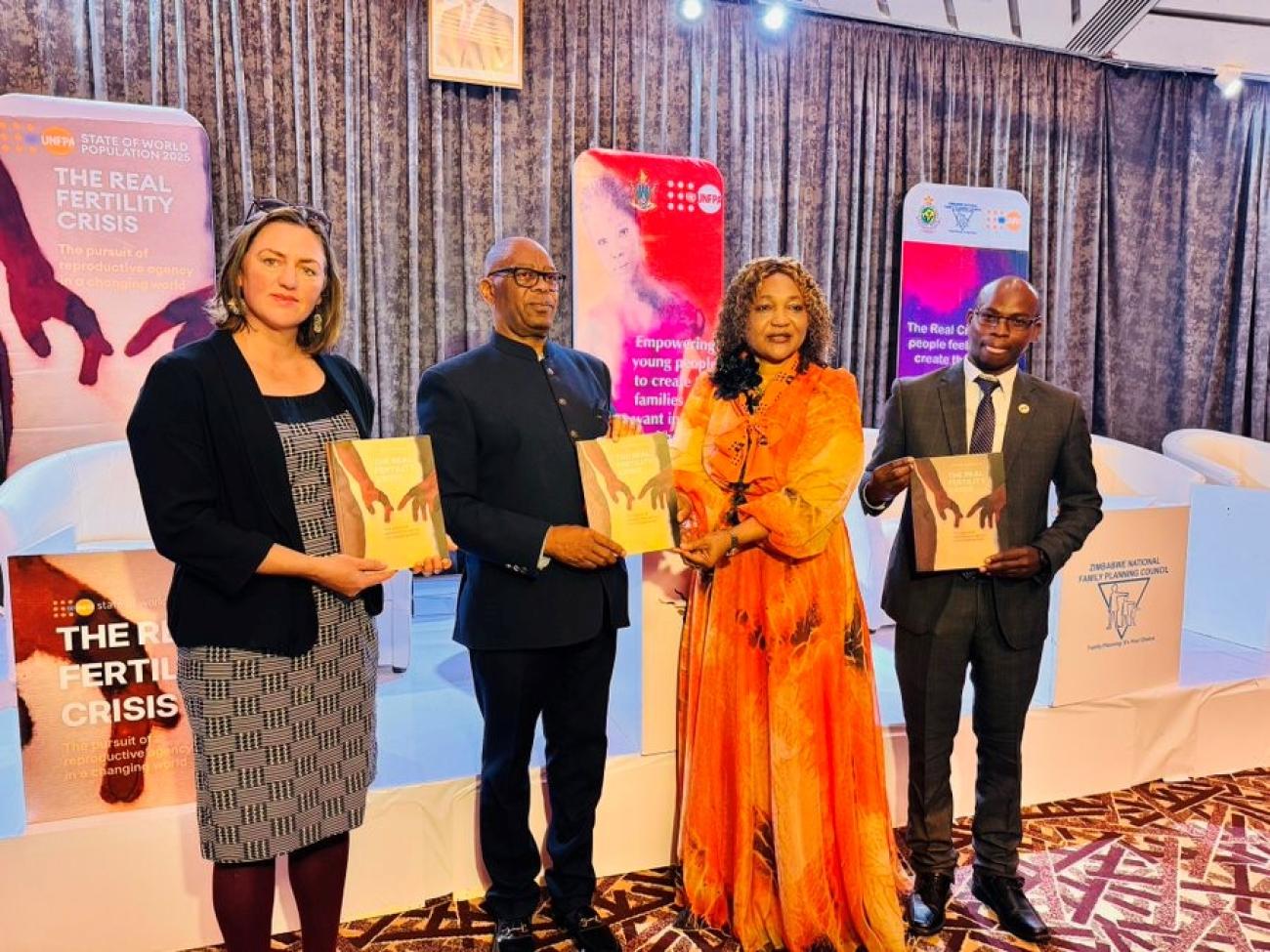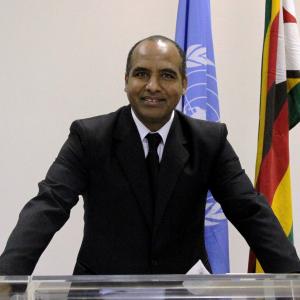Zimbabwe Reaffirms Commitment to Reproductive Rights, Empowering Choices

Population is not just about numbers. It’s about people—their rights, choices, and opportunities.
In a high-level media encounter at Monomotapa Hotel, Government of Zimbabwe and UNFPA convened a diverse stakeholders and the media to commemorate World Population Day with the launch of the 2025 State of the World Population (SWOP) Report. The event not only reflected Zimbabwe's commitment to reproductive rights but also underscored global population dynamics and their implications for sustainable development.
The Honourable Minister of Health and Child Care, Dr. D.T. Mombeshora, opened the event with a resonant keynote address. He emphasized the nation's commitment to empowering young individuals and addressing reproductive health challenges. Speaking on this year's theme, "Empowering Young People to Create the Families They Want in a Fair and Hopeful World," Honourable Dr. Mombeshora highlighted the barriers and opportunities influencing reproductive choices across Zimbabwe. He stated, "This year's SWOP Report and the theme underscore a fundamental human right—the right of every individual to decide if, when, and how many children to have, free from coercion or constraint."
Dr. Mombeshora also lauded home grown campaigns like the "Not in My Village" campaign, aimed at combating teenage pregnancies and harmful practices. He celebrated the decline in maternal mortality from 651 per 100,000 live births in 2015 to 212 today, marking progress in the nation’s health initiatives.
Achieving equitable social and economic development requires a comprehensive approach—enhancing education, healthcare, nutrition, and family planning, while adopting sustainable models for natural resource management. The event recognized that the future of Zimbabwe’s development hinges on how wisely and inclusively the Government and stakeholders navigate the demographic changes. Young people, especially, are the catalysts for long-term prosperity. Well-educated, healthy youth with access to reproductive health and decent employment can drive economic transformation. Empowering them to make informed choices about their families and futures will serve as the cornerstone of Zimbabwe’s national development agenda.
Mr. Edward Kallon, the UN Resident and Humanitarian Coordinator, echoed sentiments on population and sustainable development. "The choices made today shape the futures of generations to come," Mr. Kallon asserted. The report projects global population reaching 8.2 billion by the end of 2025, presenting both advancements and challenges. The UN Resident Coordinator emphasized, "Investing in youth is not only a moral imperative but also essential for sustainable growth."
Highlighting Zimbabwe's demographic shift, with 61% youth population, Mr. Kallon stressed strategic investments in health and education to harness this potential. He pointed out that Zimbabwe’s development hinges on navigating demographic changes wisely and inclusively.
A central premise of the work of the United Nations is that the size, growth, age structure and rural-urban distribution of a country's population have a critical impact on its development prospects and on the living standards of the poor.
Investing in people -- and empowering individual women and men with education, equal opportunities, and the means to determine the number, timing and spacing of their children -- create the conditions to break out of the poverty trap and increase levels of human development.
Ms. Miranda Tabifor, UNFPA Representative, underscored the day’s significance and the UNFPA’s longstanding partnership with Zimbabwe. "Population is not just about numbers. It’s about people—their rights, choices, and opportunities," she said. Ms. Tabifor highlighted the report's call to go beyond numbers to address the policy and social conditions impacting reproductive agency.
Ms. Tabifor reaffirmed UNFPA’s commitment to ending preventable maternal deaths, addressing unmet needs for family planning, and combating gender-based violence. Her call to the media emphasized their role in amplifying these messages to drive societal change.
A population of 15 million is sustainable but whether Zimbabwe can become an equitable prosperous upper middle human development country by 2030 is dependent on the decisions and choices that Zimbabwe now makes with regards its growing young population.
Emphasizing population issues as fundamentally about individuals’ rights to reproductive freedom and decision-making autonomy, Ms. Tessa Mattholie, Senior Health at the British Embassy in Harare, in a message she read on behalf of Dr. Jo Abbot, UK Development Director and Deputy Head of Mission said, "The real crisis is not one of population numbers, but of reproductive agency—the ability of individuals to make informed, autonomous decisions about whether, when, and with whom to have children."
Noting the importance of addressing barriers to reproductive health services to ensure equitable access and empower all individuals with reproductive agency, Ms. Mattholie said, "We must acknowledge that more needs to be done. Access to reproductive health services remains challenging for some key groups... Expanding access to these basic reproductive health services is essential to ensuring that reproductive agency is not just a principle, but a lived reality for all."
The 2025 SWOP Report launch in Harare offered a platform for stakeholders to reaffirm Zimbabwe's and the global community's dedication to reproductive rights. With collaborative efforts from government, international partners, and civil society, the event championed a vision where every individual has the agency to create the life they aspire to, fostering a fairer, more hopeful future.
In his global message on the day, Mr. António Guterres, UN Secretary-General aptly summed up the opportunities and challenges on World Population Day 2025: “On this World Population Day, we celebrate the potential and promise of the largest youth generation ever. Many young people today face economic uncertainty, gender inequality, health challenges, the climate crisis and conflict. Still, they are leading – with courage, conscience, and clarity. And they are calling for systems that uphold their rights and support their choices. Let us stand with young people and build a future where every person can shape their destiny in a world that is fair, peaceful, and full of hope.”
Zimbabwe’s 2022 Census reveals that the youth population is vibrant but faces significant hurdles. Many young Zimbabweans expressed their hopes during last year’s "Pact of the Future" consultations—aspiring to access quality education, decent employment, and reproductive health services. Yet, concerns about unemployment, rising inequalities, and limited opportunities remain pressing. These voices remind us that investing in youth is not only a moral imperative but also essential for the country’s sustainable growth.
Young people are the catalysts for long-term prosperity. Well-educated, healthy youth with access to reproductive health and decent employment can drive economic transformation. Empowering them to make informed choices about their families and futures will serve as the cornerstone of Zimbabwe’s national development agenda articulated under the national vision 2030 to become upper middle income country and the 2030 Agenda for Sustainable Development.
Written by












